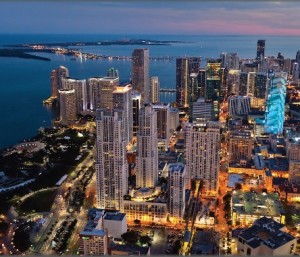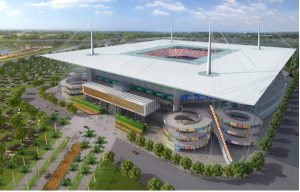The Magic City has hosted NFL Super Bowls, ocean races that circumvent the planet, international art fairs, and just about everything in between. The one glaring omission from this list: the Olympics. Granted, we haven’t deserved an Olympiad in the past, but the last decade has seen Miami become more global, more urban, more of an economic powerhouse, and more respected on the world stage.
Companies are moving here; we’re making investments in public transit, roadways, the airport and seaport; our population is growing and becoming more diverse; we’ve seen the rise of new cultural outlets; and our urban core is expanding at a rate that’s eclipsing any other U.S. city.
 So, is Miami destined to host the Olympics? Do we have a legitimate shot as a contender? Should we submit a bid for the 2028 games? All of these are questions we should be contemplating as a community.
So, is Miami destined to host the Olympics? Do we have a legitimate shot as a contender? Should we submit a bid for the 2028 games? All of these are questions we should be contemplating as a community.
The Economist runs an excellent story this week, Victors and Spoils, exploring the dollars behind the Olympic Games. From sponsorships and bond funding, to infrastructure improvements and thousands of private contracts, it’s no surprise that the Olympics are big business. But that’s not to say everyone’s making money.
Study after study shows that the cheerleaders who campaign ruthlessly for the privilege of hosting, televising, clothing, [insert your verb here] the Games typically end up in the red. Add to the list the local governments that borrow billions to construct new facilities, the companies that donate services in hopes of cashing in down the road, and the TV networks that secure multiyear contracts but struggle to sell ads (NBC is expected to lose between $100-$200 million this year).
 Even winning athletes – amateurs, for the most part – find themselves challenged with parlaying their Olympic fame into a moneymaking enterprise (as the Miami Herald reported this week), so it comes as no surprise that entire cities and countries have a tendency to break the bank.
Even winning athletes – amateurs, for the most part – find themselves challenged with parlaying their Olympic fame into a moneymaking enterprise (as the Miami Herald reported this week), so it comes as no surprise that entire cities and countries have a tendency to break the bank.
Britain’s initial budget of $3.8 billion has skyrocketed to $14.5 billion, making it the most expensive Games ever. London is not alone. An Oxford University analysis of every Olympiad dating back to 1960 shows that host cities exceed their budgets by an average of 179%.
Interestingly, the International Olympic Committee – the body which awards the Games to a given city – encourages this spending. Rather than giving preference to places that already boast Olympic-ready venues, the IOC selection criteria rewards potential host cities that offer to build new stadiums, parks, rail lines, etc.
All this money losing begs the question: why would any city compete for a chance to host the Olympics?
It’s a good question warranting an answer that includes some combination of future tourism revenues, civic pride, and a justification to make overdue infrastructure improvements.
Fortunately, this is only a blog and we’re not charged with balancing the books, so let’s put dollars and cents aside for a moment and size up Miami’s potential as an Olympic suitor.
 Working to our advantage: We’ve got two international airports that are still expanding , a growing multicultural population, ample hotel room supply, a waterfront setting with a thriving port, a stable government, and basic infrastructure systems already in place.
Working to our advantage: We’ve got two international airports that are still expanding , a growing multicultural population, ample hotel room supply, a waterfront setting with a thriving port, a stable government, and basic infrastructure systems already in place.
Working against us: Our municipal finances, mass transit (especially as it pertains to shuttling visitors between venues), hot and humid summer weather and the threat of hurricanes, and a lack of experience hosting major community-wide events in the past (and no, the Super Bowl doesn’t count).
Miami’s chief strength may be our countless number of existing venues equipped to host Olympic events. Think about it: our community has already invested significant public and private dollars into various stadiums and facilities. Build a retractable roof here and throw up some fresh paint over there, and before you know it, we’ll be Olympic-ready.
● Sun Life Stadium, with the addition of a dome or retractable roof, could easily serve as Olympic Stadium, the main stage for opening and closing ceremonies, soccer and track and field events. (soccer games could also be hosted at satellite sites in Orlando, Tampa and Jacksonville)
● American Airlines Arena is an obvious choice for the Olympic basketball stadium
 ● BankUnited Center could host hard-court volleyball
● BankUnited Center could host hard-court volleyball
● Bank Atlantic Center could serve as the main venue for men’s and women’s gymnastics
● For beach volleyball, what better venue than … the actual beach (I’m thinking South Beach, say 20th and Ocean)
● Our sailing venues are plentiful, but Biscayne Bay is the logical choice
● The Adrienne Arsht Center and Broward Center could host indoor events such as fencing, weightlifting and martial arts
 ● The Tennis Center at Crandon Park (already home to the Sony Open) is an ideal setting for Olympic tennis matches
● The Tennis Center at Crandon Park (already home to the Sony Open) is an ideal setting for Olympic tennis matches
● Rowing and crew events are well suited for the Miami Marine Stadium; the Olympics would provide the impetus for stadium improvements
● Marlins Park, with its retractable roof, is the perfect spot for baseball games
 The one venue that we would have to build from scratch is an aquatic center to host swimming, water polo and diving events, along with an official Olympic Park and athlete village. The area surrounding Sun Life Stadium has more than enough land to accommodate such a facility. Another option is designating a blighted area in close proximity to the urban core and beaches for redevelopment, which is the approach that was taken in London.
The one venue that we would have to build from scratch is an aquatic center to host swimming, water polo and diving events, along with an official Olympic Park and athlete village. The area surrounding Sun Life Stadium has more than enough land to accommodate such a facility. Another option is designating a blighted area in close proximity to the urban core and beaches for redevelopment, which is the approach that was taken in London.
With so many existing venues in South Florida and an increasingly global brand, it may be high time for a collective effort to bring the Olympics here in our lifetime. 2024 is the next available Olympiad (Madrid, Tokyo and Istanbul are finalists for 2020), but Miami isn’t on the shortlist of U.S. candidates for 2024, which includes Chicago, New York, Dallas, LA, Philadelphia and San Francisco.
That leads us to 2028. By then, we’ll probably have some more airport terminals, a couple extra dollars in the bank, new additional transit and rail lines, and — dare I say it — a few more stadiums built. Now if only we could do something about those hurricanes…







 See More Blogs
See More Blogs
Comments